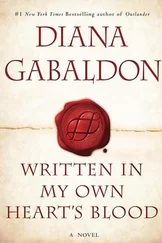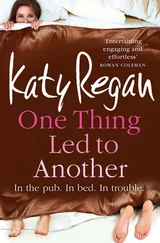It is Ellen who pulls away first. As much as she loves Jamie, it is Dr. Smithfield she needs now. The doctor stands waiting, discreetly, several feet away. But she’s ready when Ellen comes to her. Jamie watches the two women walk away from him, and he sees his sister reach for the hand of the older woman and hold it tightly. If he believed in the language of touch, he would be reassured.
BECAUSE HE’S TAKEN A SICK DAY from school to be in court with Ellen, he is at loose ends once the proceedings are over — nowhere he has to be, no one who’s waiting for him. And so he goes home to his condo, where he’s lived for the past decade.
When he walks in at noon, the first things he sees are the brightly patterned throw pillows Ellen bought to liven up the space. All those years she was away in Spain, all those years he let go by without any real contact. There’s e-mail and smartphones and now there’s Skype. Why is it that neither of them is very good about being in touch? Ellen never even let him know she was coming.
As he looks around his living room now, he knows she was right. He is content to live with so little. He never replaced the fresh flowers Ellen arranged in vases on the top of the bookshelf, in the center of the dining room table, or refilled the blue bowl she bought and piled with lemons. “I love the contrast of the blue and yellow,” she explained to Jamie and he had nodded. He liked the contrast, too, but once the lemons were gone, the bowl sat empty.
Today, without work to structure his time, he has no idea what to do with himself. He could grade papers, he thinks. As an English teacher with five classes to teach, he always has papers to grade, but he’s restless. It’s a feeling he distinctly doesn’t like and has managed to almost eliminate from his life by carefully scheduling his time: the hour he gets up, his forty-five-minute run after school, his singular nights at the dining room table grading papers and eating something he’s warmed up in the microwave.
All that routine has served to hold the restlessness and anxiety at bay, but now he can’t settle down enough to really concentrate and he finds himself grabbing his car keys and closing the front door behind him.
When he enters University Hospital, he’s struck by how busy it is. For two months he has been visiting in the slightly surreal hours surrounding midnight. But he knows the way to Celeste’s room on the fourth floor, three floors below and a world apart from the ICU, and makes his way through the crowded corridors to get there.
Now she’s out of danger. Now she’s recovering. Her broken bones are mending — her left leg has a steel plate and wire and screws holding it back together. Her shattered pelvis is healing. But it’s the trauma of the head injury that will take months, if not years, to resolve. Everyone — the various doctors who sweep in and out and whom they barely know, the therapists, and Dr. Banerjee, who has been with Celeste from the beginning — has told them not to expect the same carefree graduate student who made friends easily, spoke up in class frequently, and had strong opinions about almost everything.
Today she speaks with effort. Often there are pauses as she searches within her injured brain to find the word she wants. There are gaps in her memory, and these pain Chet the most, Jamie thinks, because it means he’s lost part of the little girl he raised. Will they come back? None of the doctors will make definitive statements about anything except the fact that she’s out of danger.
When Jamie walks into her room now, he finds Celeste sitting up in bed, attempting to read a simple Dr. Seuss book, Horton Hatches the Egg , and she’s frowning. It’s not going well. Her luxurious dark hair was cropped off sometime in the first week of her stay in the ICU. They needed to lift off part of her skull to relieve the cranial pressure, and when she slowly came through that crisis, the doctors returned the piece of bone. Now the hair that has grown in covers her scalp in soft curls not even an inch long. Her complexion is the milk white of skin that hasn’t seen the sun in too long.
In the pictures in the papers and on TV from before the accident she looked so animated, so healthy and eager. Here was a girl who rode a horse with confidence before she started kindergarten, who held her own at a dining table full of opinionated, wisecracking cowboys. A girl who demanded she be able to see the ocean every day or she wasn’t going to college. Anyone who knew her then might have trouble recognizing her now. For Jamie, this is the Celeste he knows, and to him her fragility is part of the package.
She looks up, surprised to see him. “You come …” she says and there’s a pause before she finishes her thought. “… at night.”
“Yes. You remember that?”
She nods. “My dad.”
“Yes, usually when Chet is here.” In fact Jamie has never been in her room without Chet as a buffer. He realizes he’s uncertain exactly how to behave.
“His … friend.” It’s a statement.
“I hope so,” Jamie answers and she immediately understands what he’s saying, the implication of it, a higher brain function.
And she smiles. “Yes,” and Jamie smiles back at her.
“Where is your dad?”
And the smile fades. She can’t remember where he went. She shakes her head. She knows he was here but doesn’t remember where he said he was going. And Jamie sees the anxiety — that her father has gone, that she can’t remember.
“I’ll just go find him for you.”
“Oh … thank you.” And it’s said with such relief. Such a simple thing that he can do for her.
JAMIE FINDS CHET IN THE ATRIUM at the end of the hall. A plaque at the door lets everyone know that the money to build it was donated by a grateful family whose loved one was saved by the medical staff at University Hospital. It’s a place for patients who are allowed out of bed to sit with their families and remember what the outside world looks like. The room is filled with plants — palms and ficus trees — and wicker patio furniture and glass-topped tables.
Chet is standing at the far end, looking out through the glass wall, lost in thought.
“Chet,” Jamie says quietly as he walks toward him, watching Celeste’s father turn to him.
“What are you doing here during the day?”
“No school” is all Jamie says. He won’t talk to Chet of Ellen and the court and her flight back to Spain.
“They want to move her to this rehab hospital.”
“That’s good, then, isn’t it? It’s the next step.”
Chet shakes his head. He doesn’t know if it’s good.
“For how long?” Jamie asks.
“No one knows.” Then, “I have to get back. They’ve been great, the Swensons. Understanding about it all, patient, telling me to take all the time I need, but there’s a limit. You can understand that. They’ve got a business to run, and without me there things are beginning to fall apart.”
Chet stops, turns away, and stares out over Balboa Park, a carpet of green from this height made up of the tops of all the trees. Jamie knows this man well enough now after weeks and weeks of nighttime hours spent in conversation and silence to know there’s more. He waits.
“I’m going to ask this of you, but you can say no. You hear me. You need to feel free to say no.”
Jamie says simply, “Don’t worry about that. Whatever the question.”
Chet turns his pale eyes on Jamie’s face, searches there for the grit behind the quick words. “Be here for Celeste because I can’t be.”
“I will.”
HONORING THAT PROMISE, Jamie now makes twice-weekly trips north to Encinitas and the Scribner Rehabilitation Hospital, every Wednesday and Sunday afternoons. Chet travels eighteen hours from Helena, Montana, to Encinitas twice a month, leaving the middle of the day on a Friday, driving through the night, sometimes pulling over for a few hours of sleep before continuing on, usually arriving late Saturday afternoon and having to leave again by noon on Sunday to get back to Helena by Monday morning.
Читать дальше












